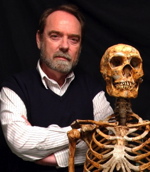Natural selection is not a creative force and can propel nothing into existence by itself. Rather it can only capitalize on what is already there. In a sense, this makes things easier for us since, as far as we can tell, in the emergence of symbolic thought there is no evidence of the kind of slow trend that would be expected under Darwinian selection.
What must have happened, instead, is that after a long– and poorly understood– period of erratic brain expansion and reorganization in the human lineage, something occurred that set the stage for language acquisition.
This innovation would have depended on the phenomenon of emergence, whereby a chance combination of preexisting elements results in something totally unexpected. The classic example of an emergent quality is water, most of whose remarkable characteristics are entirely unperfected by those of its constituents, hydrogen and oxygen. Nonetheless, the combination of these ingredients gives rise to something entirely new, and expected only in hindsight. Together with exaptation, emergence provides a powerful mechanism in the evolutionary process and it truly is a driving force, propelling innovation in new directions.
[Exaptation– the process whereby characteristics that arise in organisms in one context are later exploited in another way. Example: feathers were an adaptation that for millions of years served as insulation before they were used for flight.]


